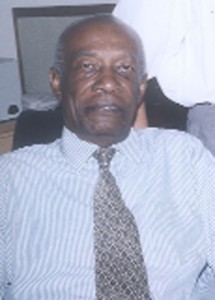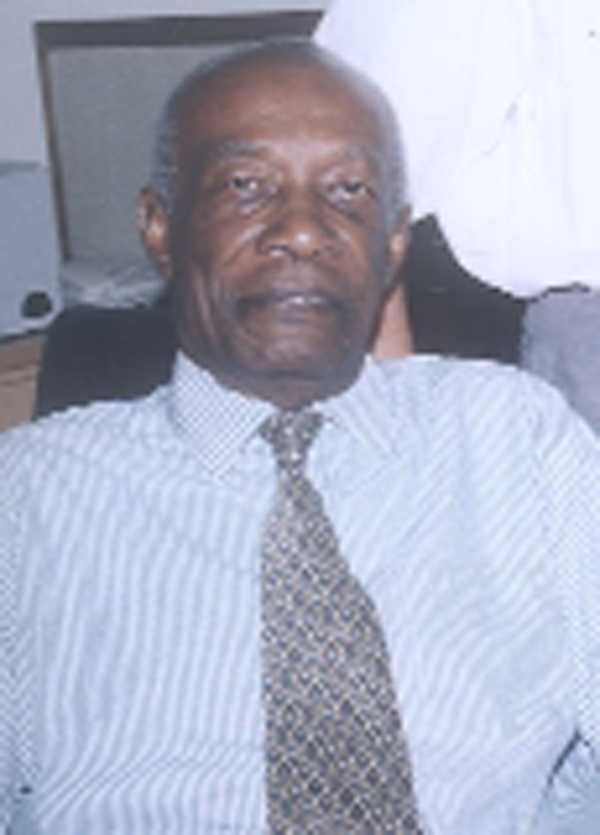By Bryn Pollard
Former Chief Parliamentary Counsel,
Guyana; Former Legal Consultant, Caricom
It is a privilege and most pleasurable for me to be invited to make this contribution on Sir Shridath’s attainment of his eightieth birthday and to pay a special tribute to him for his outstanding achievements over the past years.

Many of the tributes will undoubtedly highlight Sonny Ramphal’s achievements and contributions as an international statesman, but I will focus on our personal relationship as I reminisce on our working together.
Our friendship dates back to more than one half of a century when we attended Queen’s College with him in the sixth form and me in the fifth. We came together again when he returned to Guyana as a barrister-at-law having earned many accolades at King’s College, University of London, and Gray’s Inn of the Inns of Court. His achievements inspired me on becoming an undergraduate of the University College, London University, and a member of Gray’s Inn and it was Sonny Ramphal who later invited me to join the legal service as he was departing to assume an appointment in the legal service of the West Indies Federation in 1958 in Trinidad.
Sonny Ramphal returned to his native land in 1965 from Jamaica to become the Attorney-General at the beginning of a period of much legal activity and excitement in bringing to reality the sovereign state of Guyana. The experience was the same with the legal arrangements for the transition to becoming a republic within the Common-wealth. Working with Attorney-General Ramphal provided opportunities for development and exposure professionally on a number of national, regional and international issues. The Attorney-General’s Chambers were organized as legal chambers with legal officers having their respective responsibilities for government ministries and departments. Although Sonny Ramphal was the Head of the Chambers, his intrusion into the discharge of the responsibilities of officers was infrequent. If a conflict of opinion arose, as is to be expected in the resolution of legal issues, Attorney General Ramphal to whom the matter may have been referred was always prepared to invite arguments in the process of taking a definitive position on the issue for resolution. Sometimes he could be persuaded to adopt the course of action advised by the particular legal officer. Even when a ministerial colleague referred a matter to him for review in the expectation of obtaining a reversal of the officer’s opinion, he approached the matter in the same manner. The Minister may have been expecting a reversal which did not materialize or a reasoned variation of the opinion may have been the result in consultation with the officer.
Whenever he telephoned me early in the morning or the previous evening extending an invitation to breakfast on the day scheduled for a meeting of the Cabinet, I realized that there was something important to be discussed. There were occasions when I was invited to accompany him to the Prime Minister for resolution of the issue. I recall two occasions as examples – the construction of Le Meridien Pegasus Hotel and the establishment of the Guyana National Service. In the case of the construction of the Pegasus Hotel, our meeting with Prime Minister Burnham resulted in his abandoning his insistence that the workers for the construction of the hotel must be recruited through the Labour Exchange of the Ministry of Labour. The builders were insisting that they relied on a group of workers who worked with them on construction projects on a regular basis. Attorney-General Ramphal had fears that, if the Prime Minister insisted, there was the likelihood of the project in Guyana being abandoned and relocated elsewhere in the Caribbean. The other occasion was persuading the Prime Minister not to make enrolment in the national service compulsory. The introduction of the programme of compulsory national service was the subject of intense political debate and controversy. Those persons undergoing a period of national service were required to be away from home and to be engaged in activities intended to enhance nation building and developing the character of the individual. In the end, service in the national service was made consensual as a condition of entry into the University of Guyana where tuition fees were not paid at that time.
At the regional level, the constitutional crisis which arose in 1967 in the then Associated State of St Kitts/Nevis/Anguilla brings back memories. I met with Mr Ramphal, at his request, one Saturday evening and the next morning I was on my way to St Kitts to confer with the Governor, Sir Fred Phillips, my friend from those days in London as students. The scene shifted to Kingston, Jamaica, for a meeting of ministers of foreign affairs who had met previously in Barbados. Articulating Guyana’s position, Minister Ramphal advocated the return to constitutionality for the tri-island Associated State. The dispatch of peace-keeping forces from the member States of the Caribbean Free Trade Association (Carifta) together with the participation of British forces was under intense consideration. With a consensus among member States of Carifta for concerted action becoming elusive, the British government ultimately resumed responsibility for Anguilla.
Turning to the international arena, I will always remember the telephone call I received from Mr Jeremy Pope, the Director of the Legal Division of the Commonwealth Secretariat in London inviting me to join a small team of lawyers from the Commonwealth being assembled under the auspices of the secretariat to assist in the drafting of a constitution for an independent Namibia. I declined the invitation initially on the grounds of pressing commitments at the Caricom Secretariat. Soon after, Sir Shridath himself telephoned me and I gave him the same answer. He replied to me in these words which I remember vividly: “Bryn, this is a very important assignment for which there must be an input from the Caribbean Community and I want you to be a member of the Commonwealth team.” Secretary General Rainford was at the time in Jamaica staying at the Jamaica Pegasus and I informed Sir Shridath accordingly. Within the next hour, Mr Rainford telephoned me from Jamaica informing me that Sir Shridath had contacted him and I could make the necessary arrangements for my departure for Namibia. Eventually, I was away from the Caricom Secretariat for two months assisting in the legal processes for the birth of an independent Namibia.
It has always been a pleasure and stimulating being associated with Sir Shridath over the years. We maintain contact and exchange views on national, regional and international issues.
It would be remiss of me in paying tribute to Sonny Ramphal if I did not associate Lady Lois as a dedicated contributor to his achievements over the years. Times spent at ‘Rio Lama,’ the Ramphal’s residence in Bel Air Park, Georgetown, were not always devoted wholly to governmental business. There were occasions for relaxation and camaraderie with Sonny and Lois Ramphal as most delightful hosts. The experience was the same at their home in London.
Congratulations and best wishes, Sonny, on reaching such a significant milestone and with such outstanding achievements.

